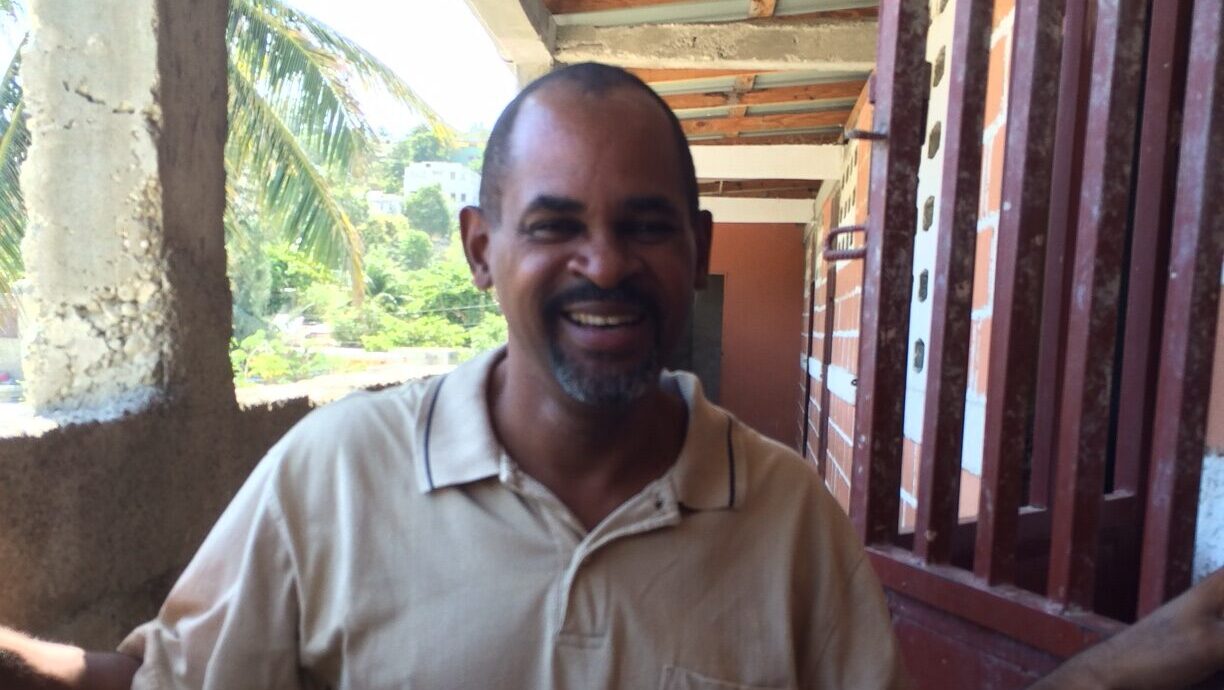by: Lauren Byrer | Writer/Editor
For the past 10 years, Francois Murat has been the Haiti Country Director with World Orphans. His work with World Orphans is a natural extension of his calling, allowing him to support children, provide food and clothing, and serve his community. Francois keeps steadfast hope in the face of ongoing challenges, including gang violence that has encroached upon his own neighborhood. He remains unshaken though, grounded in the conviction that God has placed him in Haiti for a purpose. A native Haitian, Francois always believed God would lead him back to Haiti, but not before many years of ministry in the US. His story is one of obedience, faithful service, and hope that God will be glorified in Haiti.
Tell us about your childhood and growing up:
I grew up with a silver spoon in my mouth. I was privileged. My father was a government official in Haiti. I went to the best school for boys and my sisters went to the best schools for girls. We had the luxury of having two cars in our household. My parents were able to buy a house and a beach house. We went to parties and mixed with people who were intellectual and in the government. When we left Haiti and came to the US, it was a different ballgame.
What was it like coming to the US?
I came first in 1976, but when we moved in 1980 it was not a vacation; it was a very different thing. I started ESL and GED classes. The transition was the hardest for me out of all my siblings. It was hard for me to separate from Haiti because I felt in my heart there was a time I would come back to Haiti. What made it easier was my involvement in the church. When you only meet Americans a couple times a week, it was kind of rough, because you are not really immersing yourself in the culture, so you will have difficulty in the culture. But at youth group, I was exposed to more people and became more involved.
What experiences in the US helped shape your ministry now?
For four years, I was involved in everything the church was doing; and then I came to the US and got involved there, too. I would pick up food for the Salvation Army from the south side of Chicago. I was fully in ministry. My family was upset because every time it was a holiday, I was so tired from deliveries I would fall asleep on the couch. I went to Northpark College and studied Communications. At 19, I was an engaged young Christian doing audio for the church services. I would copy the sermon and send it to people who could not come to church. I was a volunteer with the youth ministry. I got my first job as a youth pastor in 1987. I spent six summers working at summer camps from Wisconsin to New Hampshire to California. I was the kettle coordinator for the Salvation Army. I ran a summer camp and after school programs for 17 years. All of these positions were very defining in my life: working with the homeless and people with legal problems; I rubbed shoulders with drug addicts.
How did you end up back in Haiti?
In 2009, I had dinner with three separate people. My friend said, “What are you waiting for? Francois, you’ve been waiting for years to go back to Haiti; what are you waiting for?” Three times this happened. I started praying, and God revealed to me it was my time to leave. My father was in the hospital in the US and I said to God, “I’m not going to Haiti without my father’s blessing.” I told my father that. And he blessed me and said, “You are free to go.”
In September of 2009 I moved to Haiti. I had no place to go, but recommendations from bishops in Chicago and Haiti. I said, “Please do not place me in any churches because I don’t know their culture in Haiti.” I stayed a driver and a translator. For three and a half years, I stayed in Bethel Cabaret. Four to five days a week and did everything with them. It was a most enlightening experience in Haiti. I felt in my place with them. Everything I do with World Orphans I had already been doing in Haiti. Sponsoring kids and helping with food and clothing. American women are busy on their sewing machines making tee shirt dresses. They brought six full boxes of dresses and I said, “Lord, have mercy, what am I going to do with that?” It took me three years to distribute. But I was doing the same things.
How do you hope in God there?
This is a chapter, and God has placed me, and I have never lost my hope at any time. Even though the gangs three months ago were very close to my house, but where God sat me, he sat me very well. I am not shaking. I know that God is going to deliver Haiti and Haiti will be very different. My role is to allow people to not lose hope and to fight for a better life for themselves. And to find their calling to serve God.
It does not faze me whatever position hits me because I know who I am, and who I belong to, and where the Lord has placed me, and I am not shaking in my position. I know that I know that I know that God sent me to Haiti.
I’ve never had a large ministry. There was so much shooting in the area I could not get more than 16 people to come (to the church). I look up, and it is tin roofing. I can count how many bullet holes in the roof. Every Sunday at least one more hole. God showed me my ministry may be small, but I can attend to every member of my church. That is a rare thing.
It has to do with finding your place. Once you find your place in God you are well centered to accept anything that is coming your way.
What is the greatest joy in your ministry there?
Summer camp and Christmas parties with the kids. The children basically all look at me like their father. You can see the admiration in their eyes. I want to point them to Jesus.
This article was originally published in the World Orphans Spring Insight Magazine 2025.

